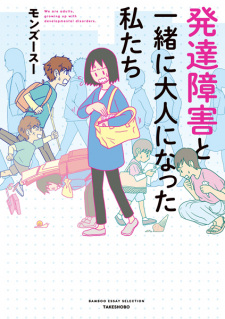Stating the obvious here but: this manga is focused on mental health, specifically adhd and autism. Every chapter presents a different story (and person).
I like the portrayal of people and their stories here, it's quite realistic. The only thing I find not to be realistic is how fast the characters manage to get a diagnosis (as shown in the comic), but I think that in all of the stories the doctor basically tells them something along the lines: "yeah, *this* is your problem, *this* is your diagnosis". I wish the author also portrayed how difficult it is to actually get a diagnosis and what
...
Alternative TitlesSynonyms: We Are Adults, Growing Up with Developmental Disorders. Japanese: 発達障害と一緒に大人になった私たち More titlesInformationType: Manga
Volumes: 1
Chapters: 26
Status: Finished
Published: Aug 10, 2018 to Sep 14, 2020
Genre:
Slice of Life
Theme:
Memoir
Serialization:
Hontou ni Atta Yukai na Hanashi Geinou Zukyun Authors:
Monzusu (Story & Art) Statistics Ranked: #23752 2 based on the top manga page. Please note that 'R18+' titles are excluded. Popularity: #12968
Members: 1,233
Favorites: 18 | Reviews
Filtered Results: 2 / 2
Sort
Your Feelings Categories Jul 6, 2022
“My brain is different” is a collection of stories about nine adults with developmental disorders (mostly ADHD and ASD) illustrated by an author who struggles with ADHD. After finding out about her condition at a late age, she decides to try and communicate these stories from real individuals to us in the hope of shedding a light on the hardships that neurodivergent people encounter in our predominantly neurotypical society. These range from bullying to work related issues, interpersonal conflicts, communication problems, harassment, discrimination, familial disputes, and many more. Despite the seriousness of some of these situations (i.e. suicidal ideations, physical violence..), it’s delivered mildly without
...
|
